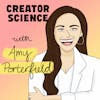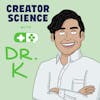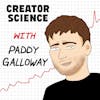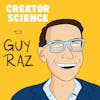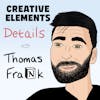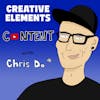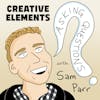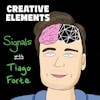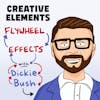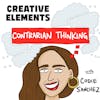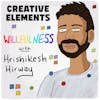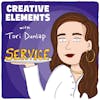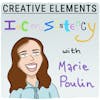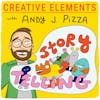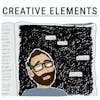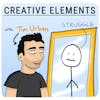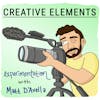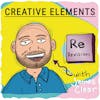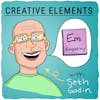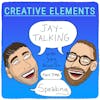
Talking about what it takes to be a professional keynote speaker
Jay Acunzo is an author, a speaker, and a showrunner. He started his career in marketing working with ESPN, Google and HubSpot. He currently hosts two podcasts. One is called 3 Clips, which was recently acquired by a podcasting platform called Castos, and the other is called Unthinkable, a storytelling podcast about creative people who break from conventional thinking to make what matters most.
I recently reached out to Jay to ask him questions about speaking, and we decided to turn that conversation into a podcast episode to help others too.
I’m calling this “Jay Talking,” a series of conversations with my friend Jay Acunzo that are less so an interview, and more so a conversation between two creators in the trenches of building their businesses.
In this episode of Jay Talking, we talk about speaking, the differences between a keynote and a breakout, how to land gigs, how to prepare for gigs, and some actual next steps I could take if I wanted to become a keynote like my friend Jay.
Check out Jay Acunzo's website
Full transcript and show notes
***
IF YOU LOVE CREATIVE ELEMENTS
Follow Creative Elements on Instagram
Subscribe to weekly episode emails
Leave a review on Apple Podcasts
***
ABOUT JAY CLOUSE
Subscribe to my newsletter, Creative Companion
***
SPONSORS
Get a free 45-day extended trial of Canva Pro
Get a free month of Blinkist Premium
Get 50% off your first three months of Sendinblue's premium account with promo code CREATIVE
***
FOR PODCASTERS
Enroll in my podcasting workshop
Enroll in my course on podcasting, Podcast Like The Pros
***
PODGLOMERATE NETWORK
This show is a part of the Podglomerate network, a company that produces, distributes, and monetizes podcasts. We encourage you to visit the website and sign up for our newsletter for more information about our shows, launches, and events. For more information on how The Podglomerate treats data, please see our Privacy Policy.
Since you're listening to Creative Elements, we'd like to suggest you also try other Podglomerate shows surrounding entrepreneurship, business, and careers like Rocketship.fm and Freelance to Founder.
Learn more about your ad choices. Visit megaphone.fm/adchoices
Jay Acunzo 00:00
I will do in my office full run throughs as if I'm on a stage walking, moving arms, everything energy, as if there's an audience with me in the office, probably 15 to 20 times before a gig, full. That's full.
Jay Clouse 00:14
Welcome to Creative Elements, a show where we talk to your favorite creators and learn what it takes to make a living from your art and creativity. I'm your host, Jay Clouse. Let's start the show. Hello, my friend, welcome back to another episode of Creative Elements. How was your Thanksgiving? I hope you had some time to sit back, relax, eat some great food. I visited my parents house with Mallory. I saw my sister, I saw my nieces. It was great. And I really appreciated the extra few days to relax and recoup. It feels like every year I get to Thanksgiving and I just feel gassed. Like I'm in the last leg or race and have already given everything that I have. These holiday breaks help a lot. Thank you to everyone who shared feedback on the new Creative Elements artwork. It's been super well received. I'm so glad you like it. And if you haven't seen the new artwork, just look at the cover art in your current podcast player, or on the Creative Elements Instagram @creativeelements.fm Well, we're back this week with a new full episode and this is actually my first returning guest. Earlier this year, a lot of wonderful people on Twitter, brought me and Jay Acunzo together saying that we seem like we'd get along and no surprise, they were absolutely right. Jay is an author, a speaker and a show runner. He started his career in marketing working with ESPN, Google and HubSpot. Jay currently hosts two podcasts one is called 3 Clips, which I've been a guest on, which was recently acquired by a podcasting platform called Castos. And the other show is called Unsinkable, the storytelling podcast about creative people who break from conventional thinking to make what matters most.
Jay Acunzo 02:03
It's spooky, it's scary, it's cathartic, it's unthinkable, questioning best practices to create work that resonates. I'm Jay Acunzo.
Jay Clouse 02:17
And when I spoke to Jay back in June of this year, I also highlighted his experience as a keynote speaker.
Jay Acunzo 02:24
I mean, I just get this charge. Every time I step on stage, there are so many people who love this brand. There are even people in the world who get tattoos of the logo on their legs. For example, no, totally kidding. No. Can you imagine? Absolutely not. I would no longer be married, no, but people do that. To be able to trot around the world and make other people feel things or ask big questions. I mean, like it's, it's addicting. It's it's the best job in the world.
Jay Clouse 03:00
Fast forward a few months, and Jay and I have become really good friends, the type of friends where whether he likes it or not, I'll sometimes send him unsolicited voice memos over text just to get his take on something. Hey man question for you as a speaker, I'm listening to a podcast and this guy that's I'm speaking to and I just heard him off hand made something seem natural that I've heard him say before, like, I know, he didn't come up with it in that moment. And I'm curious, for people, you know, and for you personally, when you have a good analogy, or comparison or story, do you archive and track that somewhere? Or does it just live in your brain, you've said it so many times, you remember it? And the great thing about Jay Acunzo is that he always takes the time to thoughtfully respond.
Jay Acunzo 03:47
Hey Jay, I love this question. So it's dependent on the person, the way I've done it historically, is just to be so on top of rehearsals and public aeration of my ideas, even before they get into a speech or a book, or anything like that, that it just sort of commits to memory. I will say though, that one of the most important things I possess is a backlog of stories, both in my podcast because that's easy to find. But also in a dropbox folder folder, I have all the slides that have been built for various stories I've told on stages, so I can just plug and play and customize to different crowds. I don't know if that exactly answers your question. But I really, really enjoy talking about speaking and I think more creators should look to speaking as a viable marketing and revenue tool. And I don't get to be on the road that much anymore. So I really like to teach what I've learned because it feels like I'm useful in that way and I get to scratch the itch. So if you ever want to talk about this stuff, I think you'd probably be a fantastic speaker, but it's also a black box of an industry.
Jay Clouse 04:45
Well, I did want to talk more about this stuff, because speaking and actually performing is becoming more and more a part of my creative life. And Jay has a lot of experience with it. So instead of getting on the phone or doing more back and forth voice memos about speaking, I thought it would make a really great podcast episode and maybe even podcast series. So I'm calling this Jay Talking, a series of conversations with my friend Jay Acunzo that are less so an interview, in more so a conversation between two creators in the trenches of building their businesses. Is it a ripoff of Jay Leno segment called jaywalking? Yes, I think that's pretty obvious. So in this episode of Jay Talking, we talk about speaking, the differences between a keynote and a breakout, panel and gigs, how to prepare for gigs and some actual next steps I could take if I wanted to become a keynote like my friend Jay, I'd love to hear your thoughts on this episode. As you listen, let me know what you think about Jay Talking. You can find me on Twitter or Instagram @jayclouse tag me, say hello and let me know that you're listening. And now, let's talk to Jay Acunzo.
Jay Acunzo 05:52
So I started in marketing, specifically content marketing, because someone told me I could create so I showed up for work. And I was like, oh, I wanted to be a sports journalist but now that I'm in marketing, and this huge movement is happening called Content Marketing, don't love the word content but that's a different bag of cats. Maybe I could forge ahead there. And so that was about, say, 2011 and I remember thinking, I was working for a startup. And they installed me as their director of content. So writing blog posts, writing ebooks, you know, sort of the designated content creator in house. And I didn't know what director of content meant, which maybe sounds weird to some people listening, because it's such an accepted thing. But so I sought out someone else with the same title named Arestia Rosenberg, who was director of content at a big agency in Boston called Hill Holliday, and she was actually very focused on video and documentary. So I was a writer coming from one background, she was a video producer and director coming from a different background, we both had the same title, we were both serving brands, what gives? So we started a community meetup to be like, I don't know what the hell this career path is but I like it. And where else does this take us? And also, who else can we meet? And so you fast forward about a year of drink meetups and panel discussions, I'd started to get invites around Boston, to speak at other people's organizations, nonprofits, associations, in house, you know, marketing teams, and I fell in love with it. I truly, truly loved it. So that was my first initiation into it. I hadn't quite thought about it as a business as a revenue generator yet, but that was where I started to see consistent gigs, if you call those.
Jay Clouse 07:28
Okay, I can relate to this part of the story, I think, because I've been invited to speak at meetups here locally, it's fun. I love doing it. I've probably done, I don't know, a dozen type of things like that. But I've always gone into it with like, okay, I'll make a slide deck. And I'll talk through that slide deck. And that's like the extent to which I've thought about it as a product or a thing. And the reason I want to talk about this is I'm realizing that I've really had a limited view of what actually goes into making a good talk that isn't just like, hey, we've got this person to come in and share a little bit of insight, but like, is intended to really move somebody or educate them in a way. So when did that change for you or am I been thinking about it the right way?
Jay Acunzo 08:11
No, I think you are like there's I think what you're talking about really is a difference between a keynote and a breakout, which we can definitely define and probably shouldn't a bit but to answer your question more directly, I think luck meets opportunity, however you want to phrase it. A friend of mine, a now friend of mine and mentor of mine named Andrew Davis, was also living in Boston at the time. And I didn't know this, but was thinking about starting an agency to help aspiring business authors and speakers sort of established themselves publicly and start that business. And he'd been doing the public speaking thing for, like 10 years prior to that after selling his marketing agency. And I just on a whim, tweeted him didn't know him at the time. And I was like, hey, I run this community meetup. It's called Boston Content. You're like a famous content marketer. You're a great speaker. Would you come and just do an informal kind of chat Q&A, you don't prepare anything, come and hang out. And he's like, hey, thanks so much. I'm rarely in town because of my speaking business. I'm in town next week, can we get a beer? And so I just walked in thinking, oh, cool. I'm gonna like book this amazing speaker for free out of the goodness of his heart for my community meetup. And he pitched me on this idea of becoming like his guinea pig client for this agency, which no longer running, but he showed me the ropes. So I just want to lead with that because everything I learned about the difference between like, I'm putting together slides and sort of standing in front of a room and going slide by slide and I'm a performer. I'm a professional speaker. I'm a keynote speaker, everything I learned from him and there is a distinct difference.
Jay Clouse 09:38
How would you describe that distinct difference? Or how did you get brought into it from Andrew, where you started, like seeing things differently?
Jay Acunzo 09:46
Yeah, there's like a hidden difference and a visible difference. The hidden difference is, you act a lot more like a stand up comic, where you're developing your talk, it's a product, you're not there to share your expertise necessarily, although maybe that gets you in the door. You're there to share what you found. So you go and build and write and aright your ideas, you're an investigator into a problem that can't quickly be Googled. So a breakout is pretty much the prescription. It's pretty much like a something you could find off from Google but manifest live in a room, which maybe has more interactivity to it. A breakout is a how to type a talk but a keynote is a how to think talk. And so you're getting up on stage to challenge people. And to hopefully do so tactfully in a way they respond positively to. And so you'll learn all these frameworks as a speaker, for how to both aright your ideas leading up to the speech, develop your talk by actually putting it in front of real audiences, and then packaging it in a way that like, even though you're already at Z, they're at A, so you have to go and hit every letter in between. So they instinctually go, oh, my God, of course, Z. That's the solution. That's the big idea. It's, it's, it's irresistible. So there's all these mechanics and frameworks, and it's like really tiring, honestly, you gotta love it to do that. And and the closest analogy I can give you is, it's like being a stand up comic, where two years from now you want to have the Netflix special. But right now you're starting from scratch. And so what do you do? You write, you tinker your test, you put in front of people, you do it again, until you feel like it's somewhat ready for the primetime of it all. I love this topic, man because I just fall I fell in love with this craft. And I know I can't do it very long, or maybe not for a while, right? So I'm like, yeah, I'd love to teach other people to do it. And it's such a black box, I had such an advantage with Drew, as my mentor. Like the dialogue outline is the most important thing I've ever learned from him, from anyone really, the dialogue outline is how to how to construct and communicate a big idea, such that people get on board with it as inescapable and irresistible, that like amazing moment where they slap their foreheads, and they go, oh, my God, of course, like when an idea when you're like, it's so simple, yes, there was a lot of work and complexity leading up to that moment. But I think like many things, you can distill, or at least make the complexity manageable, if you have a good structure. So it's literally like a block by block structuring of a keynote speech in a way that others need to hear it, not how you want to deliver it, because you're way, way too full of context to know, either you're too close to it. This is a way of like stepping outside and thinking like the audience and literally having a dialogue. What's the first question that they might be thinking you have to answer it? What does that lead to? What's their next question, you have to answer it. And my tendency, and I think a lot of people is to lead way too far ahead. So the idea sort of kind of resonates with some of the people in the crowd, instead of everybody being like, holy crap, we need this.
Jay Clouse 12:47
What's your starting point? And I asked because let me give you some more context, because maybe this will color your response a little bit. If we're talking about like, okay, I have an idea that I believe strongly in now I want to develop that into a talk. I feel like I have that with this idea of creative independence, or even this creative platform idea that I've started talking about, but that might not be the right direction. So how do you start when you want to put together a talk or have been booked for a talk? Do you even get booked if you don't have the talk done already?
Jay Acunzo 13:14
Yeah, you have to sort of decouple a few things, people will get booked because they're famous but fame is one element of the way you get booked and also the way you can price Your expertise is another part of that and your entertainment value is a third, and you can control all three but none of that matters unless the moment you start to speak, you can deliver like you need a good talk. That's the product. I was doing a speech in Boston a couple years ago, and the speaker before me was Magic Johnson. And it's like, thank God, there was lunch in between, because who how am I going to walk on stage after Magic frickin Johnson. But when you look at like speaker reviews, or you look at or you talk to people, someone like a Magic Johnson, he's not a professional speaker so he fills seats. And what drew Davis taught me is like you want to fill minds. A breakout is to fill notebooks, you want to fill minds. You want to challenge people, like you want them to walk away with that good kind of brain hurt and that's built. That's not like a moment of genius. It's not found, it's built. So how do you build it? So where you start is I think this this is just how I operate anyway, frustration. What is bugging you about the industry you're in, the community you're trying to serve? What can't you stand, and then turn that it's like a match, right? So you like the match and the purpose of a match isn't to sit there holding it. You want to use it as a way to like light some kindling. And like most people just sit there holding the match and they get burned. And I basically just described Twitter, just it's a lot of people holding matches. But you want to put that to some kindling, which is curiosity so you ask questions. And these are not questions that have a simple answer on Google. It's like, when I started my podcast Unthinkable, I was like so disillusioned by the word best practice or the phrase best practice. Why is everyone so obsessed with these things? Everyone else is doing it this way or it's born of a different era. We're doing commodity work because we love the idea of best practices, why? And so you go on an investigation, you ask those questions, and you do some research and you talk to people and you write articles and you create a podcast and you just on it on on your aright your ideas, because the fire needs oxygen, right? So you turn this frustration into curiosity, and you create a ton of content and that sharpens your thinking. And it's right there that I think we were like, okay, I have these consistent through lines I've found or soundbites I keep saying and thinking through, you start to actually draft the speech, you create an outline of that speech.
Jay Clouse 15:36
Interesting. So you're saying, your process for making a talk is actually doing a lot of content generation ahead of time where you have like the spark, and you're like, okay, how do I build upon that? And you're almost creating like, mini assets or artifacts. And then once you have a stockpile of that, you start to pull some of them and reconfigure them and turn into a talk.
Jay Acunzo 15:59
Yeah, because it's like, I'm Italian. So everything comes back to food, it's like making a good sauce. You don't want to eat the sauce right after the ingredients have been added to the pot, you need to cook it down for 4, 5, 6, 8 hours, and then it becomes really, really delicious. It's the same with a speech, the speech should be the most like potent things, potent ingredients cook together. And so that that cooking process involves a lot of stuff, it involves finding all the stories you're going to tell and telling them well elsewhere and seeing if they resonate, or just telling them yourself, so you get the practice the insights, you want to rip out from those stories, any kind of methodology that you'd like to share with people. So you have all these ingredients and the cook time is content creation time, reflection and research time, and also putting that in front of audiences. And if you are not getting a lot of gigs, or you're worried that the next gig is too high stakes to bring up a rar type of speech, you can do that digitally. I mean, we live in this wonderful era where you can do that. But the key here Jay is like it starts with something that you can't simply Google, you can't find it like the point of a keynote. And what people are paying for is helped me see the work differently, like helped me see this, like hidden truth that you've gone and dug up for us, and then teach me how to execute that on the back end. So it's less like, everyone knows, I want a podcast. So here's my talk on how to podcast. And it's more like how to connect with people deeply in a world trending shallow. And you might propose later in the talk that hey, one option is a podcast, but you're leading with the problem, you're leading with the frustration, and then you're marching people every step of the way, they need logically to arrive at a big idea they hadn't considered before to fundamentally change them. And I don't know how else to do that, unless I've walked all those steps with an audience digitally first.
Jay Clouse 17:47
Yeah, the process of like finding stories and distilling lessons out of the stories is something that I've been thinking about a lot lately. And, you know, when I sent you a voice memo on one of my morning walks talking about this, it was along this point, because the more that I pay attention to people who I see as good performers, and I don't mean performer in like any type of pejorative sense, sometimes I will like tell Mallory like today, I spent all day performing. And it's just like, just a different mode of existence and delivery, right? But people who are really good in that mode, I've been trying to pay more attention to them. And they're also good at illustrating points with stories. And they just know them so tightly and so well.
Jay Acunzo 18:29
Yeah.
Jay Clouse 18:30
And that can't be a quick and easy process. You know, like if, when my mind went to, you know, I'd like to learn more about speaking I'd like to get better at performing. I can't just like do that in a week and put together a great talk or even in a month, probably because there's so much discovery of stories and cataloguing and even like stories that just come from general life I feel that you like come into contact with accidentally and you say, actually, I want that. I'm going to I'm going to remember that and take from that and you can't compact that.
Jay Acunzo 18:57
Yeah.
Jay Clouse 18:59
After a quick break, Jay and I talk about the similarities of speaking and stand up comedy and why speaking gives you the opportunity to explore ideas outside of your industry. Right after this. Welcome back to my conversation with Jay Acunzo. In my original voice memos to Jay about speaking. I brought up Bo Burnham's performance in his newest special Inside. I don't know what it is about comedians, but a lot of creators that I talked to will often watch and learn from comedians. And especially in speaking where you get on stage in the role of entertainer. There are a lot of similarities.
Jay Acunzo 19:32
What I love about speaking is like the same thing a lot of comedians level up stand up comedy is it's this or not, it's like it's all or nothing. Here it is take it or leave it. I hope this resonates and I only know that it does because I've done it before. It's like a lot of pithy advice exists, right? It's like if you want to write, write. If you want to podcast, podcast. If you want to speak, speak, and people go well, I haven't been booked. I'm not famous enough or I don't have the big idea and it's like all of that is built and don't get me wrong. I am privileged wrap in privilege wrap and like I am white, straight male born in the Northeast, the US with two loving parents and all the opportunity in the world, right? So this is this is hard for a lot of people, it's hard for me. But you can start to create your own opportunities, whether it's virtually or in person around you to build up towards that big audience. And along the way, you're going to suck up a lot of stories like you're saying, it's, if you're thinking about that problem, that thing that frustrates you, or the question that Google can't answer, then everything is material, and you become this refinery for it. And one way to refine it is you just get good at spotting patterns and telling stories. But another way to refine it is like, I'm going to talk to Jay, like, I'm going to call him up, I'm going to shoot him a voice memo and be like, is this a thing? What do you think? That's Jerry Seinfeld's book, isn't it? Is this anything? That's the process, kind of it's not glamorous. It's you can put frameworks to it but it's it's, it's earned. It's built over time.
Jay Clouse 20:53
One of the things that prompted me to text you about this in the first place was listening to Creative Pep Talk with Andy J. Pizza, who has since me texting you. I interviewed him on the show and that show has aired. But what I learned from him was David Sedaris tours when he releases a book, and he doesn't talk about the book that he's touring on. He reads from books he's working on, that just blew my mind. Yeah, like that is so smart. That is so cool. I've never heard that in the realm of non comedians on the road.
Jay Acunzo 21:27
Right. A buddy of mine, Shane Snow operates in a similar way. So Shane's an incredible business and pop psychology author. And his most famous book is called Dream Teams. It's why some teams work well together, while others fall apart. So Dream Teams by Shane Snow, awesome book. Shane talks about going way outside of his echo chamber to learn and steal stuff, and then weaving that slowly into conversations with friends and colleagues, and then writing about it in existing writing projects, and then eventually becomes this like, discreetly named thing he's working on. But that's like six months later. So I dubbed this tactic imports and integrations. It's like, you're gonna go way outside your echo chamber, because you're thinking about the problem. And you're, like, agonizing, like, why is everyone so obsessed with reach? What about resonance? Like, why do we love best practices? Isn't that like, just an approximation for what we should actually do? It's like, all these questions. And then you see something in like, sports, because you happen to be a sports fan or wherever. So what Shane does is he he imports things from outside his echo chamber. And then he integrates them into the regular conversation he's having having with friends and family and a little bit of content here and there, and he just watches for reactions. That's it. That's all he's doing all the time, constantly. And every so often, something lights him up enough, or resonates deeply enough where he's like, aha, that's gonna be the next book, and speech and project, or at least he goes to the next step, which is like the higher friction project to do, right? From conversations to the newsletter this week, that kind of thing. And every so often, I feel like maybe, I don't know, less than 10 times in a career, if you're lucky, you find like a really big goldmine. And you're like, I can strip mine this and keep digging into it over and over again. And so one for Shane is teamwork, one for me as best practices like, Jay, I'm really excited to see what you come up with for your talk and your book.
Jay Clouse 23:15
That's awesome. That's the stuff. That's the stuff that gets me really excited, because that is like the reward of just following your interests, even if it is kind of shiny objects in a way, because I am so like, militant with my time right now, because I have very little time margin, where I just make myself feel so guilty when I'm exploring things that don't have a clear immediate through line and connection to the work that needs to ship like tomorrow.
Jay Acunzo 23:42
Well, I think I think words matter. So I just, I just want to jump in there because I think as someone who loves to get starry eyed about creativity, I would say the word exploration and explore a lot. And over time through talking to other people about this idea. You know, I mentioned Andrew Davis, he's a good example, where I landed now. And he sort of convinced me this investigation is better. I think exploration and I haven't quite figured out the difference but I can sense it. It's like exploration is fine. If you're just going on a walkabout and you're trying to clear your mind, you're just you know, maybe you're not sure what you're working on next. Investigation, it starts with a problem, right? You're on the case. And so I think that's where the guilt for me anyway goes away. It's like, I know, I'm not actually working right now. I'm consuming this other thing. But in the back of my mind, or in my subconscious, I'm really annoyed at this problem. And I know that's the thread I'm pulling, or I'm really fascinated like right now mine is resonance. What does it actually take to create work that resonates with people? What does that mean? Is there psychology or history to it? Are there frameworks and through lines, what stories can I find in all walks of life? I'm fascinated by it endlessly. So given that I can go and sit somewhere else, walk somewhere else do something else that I kind of could feel guilty about because it's not really related to the work, but it is as long as I know like I'm still on the case, even if I'm not actively investigating it. So I think the most important thing we can do is, is to start with that problem and have that frustration in the back of our mind, because then all that stuff becomes productive, even if it's not like intentional active, and sometimes exhaustive types of productivity.
Jay Clouse 25:18
Pre COVID, when you're on the road a lot, talk to me about what like the lifestyle of somebody traveling a lot, going on stages a lot looks like.
Jay Acunzo 25:27
It started pretty lean. It started with like a few gigs, maybe 9 to 12, in the first year that were paid and not paid that well but it's a flywheel. And so the most most valuable asset for a speaker is not their digital identity, necessarily, it's stage side leads. It's another concept that got from Drew stage side leads, you want someone who in the moment walks up to you, or shortly thereafter and goes, I'd like you to speak and do what you just did to my group, to my event, to my brand. And so that's the lifeblood of a speaker, at least my style of speaking, because I'm not uber famous, right? I don't have endless air game. And I do think you get tired, I know event planners get tired of like Malcolm Gladwell same idea over and over, like, there is some fatigue for some famous people. And that's why even they reinvent themselves. And so, at first, it was very few gigs, and then you start to win some of those stage side leads, and it starts to pick up. And so you raise your rates. And I split, you know, I think you want about a 50% fail rate to know that you're pricing correctly. And at my peak, I was doing something like 25 paid gigs a year, on the road, you know, two, three times a month, sometimes there was one time I did like Nashville to Whistler to Austin back home to at the time in New York. And that part is grueling. You know, I had a friend and a speaker who books about a million a year, Scott Stratton. He's in the marketing space. He said, you know, I could do without the hotels and airplanes. But everything else is pretty damn awesome. So it can be grinding, but you're on the road constantly. And so you have to make the sky is your office a lot. The hotel room is your office a lot. You're away from your family a lot, which I don't aspire to do anymore so it is a trip.
Jay Clouse 27:06
Yeah, and let's say okay, so you're doing that 24 ish gigs in a year, were your talks themselves pretty well structured and known for those or were you generating things in real time during that year?
Jay Acunzo 27:21
That's the biggest switch, I think between a professional speaker and someone who does the one off speech, you're giving the same talk, now you're customizing it, we should get into that. But you don't want me to do something brand new and bespoke, you want me to do something that is incredibly proven and well wrought and resonates deeply and serves your audience. And I can do that, because I'm speaking to some foundational human truth as a keynote speaker, I'm not predicting this, you know, I spoke to a group of people in HVAC right? Local businesses, HVAC companies, I'm not predicting the next trend in HVAC. That's not what I do. I'm not telling you how to make a podcast step by step for your niche. I am trying to speak to something foundational, that while appealing to the universal feels incredibly specific to each person, like a great reaction, as you hear stories from people after a good keynote, where they're like, oh, wow, I saw that show up in my work like this. And it's different than the last gig you had where they said, like that. So you see how these foundational ideas can apply to lots and lots of people. So it's universal, it's broad enough that it appeals to the entire event. And lots of sectors because you are speaking to the entire event, not the breakout tracks, but also feels so deeply rooted in their day to day in the personal emotional reasons, they're doing the work that it does trigger those reactions. So it is the same talk with moments and pieces that are customized. And that's why you want to create what they call a modular speech. So you, you know, people use different structures, I have a set structure called the dialogue outline, but you're building each piece. And then certain things change, like, I'll give you two examples. Number one is in a prep call with the client, I always ask, how does your event attendees? How do they address the person on the receiving end of their work? Do they say customer or client or user or student? So I make sure I update some of the language that way. And then the other is this for my speech anyway, this stories like I have such an advantage, which is I've been telling podcast stories and written stories for years and years. So I have a backlog. And I know those stories well, so I can plug in a story that is more relevant to this crowd than another crowd. But the lessons, the insights, even the physical movement onstage, I know, every single move, except the ones where I'm improvising. And I can only improvise, you know, keep the laughter rolling or acknowledge someone who made a funny noise or whatever, I can only do that stuff because every other element of the talk is completely internalized.
Jay Clouse 29:49
So let's say I'm going to get really specific here. You have a talk on basically opposed to best practices, right? What's what's the name of that talk?
Jay Acunzo 29:58
So same as my book. It's called Break The Wheel: Question Best Practices, Hone Your Intuition, Do Your Best Work.
Jay Clouse 30:03
Okay, so I'm an event organizer, and we can pretend this was two years ago, if you want. I'm an event organizer and I just booked to you to do your Break The Wheel talk. So we get on a call, you ask them those questions to customize, what happens next in your mind to prepare for that event?
Jay Acunzo 30:19
Because Break The Wheels talk, I've done a lot. I'm very familiar with all the movements and all the, you know, everything. So I might update some slides, depending on the language, like maybe it's a group of university marketers, so they say students, instead of customers, I'll update the language on my slides accordingly, I will rehearse a disgusting amount because I think some people say I don't want to sound rehearsed. Like, if you sound rehearse, you haven't rehearsed enough. So you can sound unrehearsed and totally sloppy or you can sound professional, and also off the cuff and natural because it's so a part of you. You're like a musician, or yeah, a comedian, you don't have to think about it.
Jay Clouse 30:55
Like full run throughs, every time you're rehearsing this?
Jay Acunzo 30:59
I will do in my office full run throughs as if I'm on a stage walking, moving arms, everything energy, as if there's an audience with me in the office, probably 15 to 20 times before a gig, full, that's full. And I might say like, oh, this story is a little unfamiliar to me, but I wanted to plug it in for this group. So let me do that five minute bit. You know, another 10 times. Most people want to say they rehearse. They're like, I've done this talk before on stages. And also, I'll do it the night before a couple times. More power to you if that works for you. That's just not how I operate and not how it's been shown to me either. So a ton of full energy rehearsals that's that's actually the lifeblood.
Jay Clouse 31:38
Do you have any audience at all in the rehearsals or do you record?
Jay Acunzo 31:40
Nope, I will record myself in my room sometimes, mostly, because I'm thinking about some movements, or how big I need to play something. Another little trick that I love is you just set up your phone on a tripod, actually at the event, and film both yourself. So you can see you know how that is, but also the audience because you really want to see sometimes it's hard when you're in the moment to know like, did they react the way I thought, you know, was the silence really silent and powerful was the laugh what I wanted. So you show the audience, so I'll do that sometimes, too. And that's not every single speech but it's profoundly useful video content, not for promotional purposes, but like game tape purposes, is huge for speaker.
Jay Clouse 32:21
Real quick for context, what's what's like the biggest room you've performed to?
Jay Acunzo 32:26
I suppose I was the opening keynote speaker at the world's largest content marketing event called Content Marketing World, their attendees are I think, 6000, something like that.
Jay Clouse 32:37
How different did a 6000 person seeder feel from 50% or 100% to you?
Jay Acunzo 32:44
My style speaking and people can even probably sense this from my answers here, is probably better suited for the big crowds than the small ones, like I'm more naturally that way. And so I find that when I do a smaller group, you know, 25, 50, however, I very consciously have to rehearse the opening moments, because I have to like level set with the energy because if you come out to a group of I've done this before, roundtable of CMOS, and it's 25 people and everyone's drinking coffee, you're chatting with them ahead of time, and there's no stage, just walk to the front of the room and do your thing. If you're like, out of the gate, like a massive performer, you know, like arena rock style, you have problems. So you gotta I got to harness that energy and rehearse it.
Jay Clouse 33:28
What do you do? Sorry, I'm just peppering you with questions.
Jay Acunzo 33:30
I love that I never get to talk about this stuff, please like the more detail I can be let me know, this is awesome.
Jay Clouse 33:35
What do you do to encourage these stage side leads that you're talking about?
Jay Acunzo 33:41
The most important thing here comes the pithiness is to deliver a transformative talk to actually have an idea that actually resonates and actually serves the audience in a deep way, right? Because they are hiring the program, they are hiring the idea, they're hiring the speech, not you. That is my firmest belief and I'm a part of it, I'm a feature of it but it's not the product. I am not the product. So they're not that yes, you might say you're booking me, no, I think in my mind, you're booking the speech, you're booking the talk, it's this externalization of the art and the craft that lets me work on it and tinker on it and avoid imposter syndrome and all those internal maker monsters we experience. So that's the first hurdle is are unsolicited, are they coming up to you? The other is you get to a certain level where either your schedule is so busy, like you're booked back to back in two different cities or you your ego consumes you where people just drop in and leave right after the talk. Like literally I've seen people get off the stage and I'm like hello mister so and so like hello, miss on some big fan and they just grabbed their suitcase and peace out. Because honestly, it sort of does something to you to have your art be presented on a stage and have people clap before you go and after you go. Like think of how many human beings work their ass off tirelessly for years and years. And no one even says thank you. You get two rounds of applause as a speaker for doing a 45 minute talk. You kidding me? So that can mess with people. So another thing is, stay humble. Like realize you're there to help people realize it's not about you. It's about the idea and the talk that you've built and found and go mingle, like be a part of the tribe, not above them, which is hard, because again, you're on a stage. So it really does the the idea of like micro fame, however micro or macro, it might be, it can mess with you.
Jay Clouse 35:29
Do you have any, like ending slides of the call to action, like, follow me on Twitter or go download this thing so I can get your email address?
Jay Acunzo 35:37
A lot of people will do that. And I've been in very many online discussions with other speakers like in community groups and masterminds, where people debate that it's like, weirdly one of the most hotly contested things, because sometimes, it really sucks the air out of the room. Like, I'd rather you have this moment where you're just so blown away, and so excited, you want to leap out of your chair, like how do you get the standing ovation? If you drop people in the momentum off the cliff, and you're like, okay, that's my time, you can find me at this link here, like download my white paper, thank you bye, like you really want to end with the most power possible. So the only workaround I can think of is before your final close, that point, you say hey, by the way, I've had so much fun today, thank you so much for your attention. If you want to keep in touch with me, here's my newsletter, here's this thing exclusively for you, like, you know, because remember, and then you get back the momentum but even that sort of kills some of it. So for my money, it's letting the event organizers do their job, and let their attendees know how they can reach you both live at the event. And after that takes care of it for you. And then you and go go and collect business cards and interact with the crowd versus you torpedo at least a part of your speeches momentum by doing a CTA.
Jay Clouse 36:47
Yeah, I could, I can see how, like tactically, that's probably where my mind would go first but your point about like, sucking air out the room totally. So maybe it's like putting your Twitter handle on the bottom right of the slide. So people see that very passively throughout, as opposed to making a direct ask because I can see where it can be like very powerful to build your own, you know, own audience in email or somewhere else.
Jay Acunzo 37:13
I would say if your talk is not letting people do that, you're probably only catching one or two other people. I mean, like honestly, like the discussion in those speaker groups is like, yeah, I've done this for 10 years, the conversion rates are terrible. And like, you have that one outlier marketer who speaks to like other marketers, and they get the game or whatever. But I am in the camp of let your ideas and your entertainment and the emotions you convey, do the work and be eminently available elsewhere. Like everybody can access you instantly on the internet, right? It's like at the end of a podcast, where can people find you? On the internet? Right?
Jay Clouse 37:51
And hard to avoid actually.
Jay Acunzo 37:53
Yeah, where can people find you? Or you know, better questions like, what project is really exciting for you right now, like, sure I get that. But like, where can people find you as a speaker, on the internet? And if you're not so compelled to do that already, which is such an easy task. It's in the palm of your hand while I'm talking. I don't know if a slide is going to do that for you, right? So that's that's my bias, I recognize it as a bias but that's what I go with.
Jay Clouse 38:15
When we come back, Jay and I talk about how we booked speaking gigs and communicates with event staff. And later Jay gives me some advice for how I could take next steps into my own speaking future. So stick around and we'll be right back. Hey, welcome back, all the way back in April of 2020 on episode six of the show, I shared an interview with Grant Baldwin of the speaker lab is basically the only other episode on speaking that I've recorded. And he made a very big point of sharing how important his assistant Lisa was in his speaking business because she coordinated with the event managers.
Grant Baldwin 38:50
Part of what the event is hiring you for is to do a great job on stage. But part of what they're hiring you for is to be amazing off stage. When you think about it from an event planning perspective, there are hundreds, if not thousands of moving pieces that go into an event. And so the smoother you can make things for them, the easier you can make life on them, the more likely they're going to want to be to work with you. So let me give an example. When I was doing 60, 70 gigs a year, we would always be really committed to every event I would ask for like a testimonial or recommendation letter of some time, something that I can leverage into a future event, right? And so I would go speak somewhere I would get a recommendation letter and the recommendation letter would be like Grant did a great job on stage. He was awesome to work with and we loved working with Lisa. And then they would go on and on and on and on and on about Lisa, now who's Lisa? So whenever I would book something, then I would pass the baton to Lisa, Lisa was my assistant and she helped with the contract, the travel, the logistics, the details, all that sort of thing. And so they would go on about her because she made their life easy.
Jay Clouse 39:52
So I asked Jay what type of communication or follow up he has with event organizers after an event?
Jay Acunzo 39:58
So at this stage in my speaking career, I'm very lucky to work with a guy by the name of Josh White, who manages other speakers at an agency called Epic Keynotes. And so Josh is doing a lot of the process driven documentation legal, you know, with me and for me, when I was doing it all by myself, you know, I'm a believer in acting like a partner. Again, there's too many like swooping flyout type speakers, even at my level. And so, you know, upfront, I'm being very communicative, like, hey, I'm really excited, like, let's do that kickoff call, we did the kickoff call, here are my slides and anything I need, like my AV requirements, way up front, all of that, at the event, as soon as I land, I always text the people that had hired me to be like, I'm in town, because like you're planning an event, you have a million things going on, and having some empathy is really important. Like, they would panic to know like I was delayed or whatever. So it's just like, hey, wanna let you know, I'm in town, if they invite you to a dinner happy hour, go to the dinner happy hour, like, you know, be incredibly visible and communicative the whole way through. And then after the event, the day of I always send an email being like, that was amazing. Thank you, you know, I convey what I heard from attendees, because oftentimes, the hard work of those event organizers goes unrecognized. And so here's some qualitative statements I got that you can use, with your bosses, with your clients, like put on the website, this is what people are saying to me about the event so I share that information. And then about a week or so later, I will send them my slides, because I let the dust settle. It's like, here's a PDF of my slides, feel free to distribute this anywhere. But a week after that, the final note is just to convey how important testimonials are for my business. And I asked not for a testimonial, I asked a few very specific questions, because those are easier to answer. And then I respond with an amalgam of those answers that they can approve as a testimonial.
Jay Clouse 41:47
This is awesome. How proactively, when you're at like your speaking peak pre pandemic, were you doing outbound pitches to get on stage?
Jay Acunzo 41:58
This is another bias I have, you can use those as a way to practice if you're like, I'd like to get on stage more and aright these ideas, and even then questionable, because you can just sort of do it locally, or string up a website and like, you know, put it on YouTube, or hopefully have some number of people following you even if it's 10 online. I think a lot of speakers might agree but calls for speakers are not for paid keynote speakers, it's really hard to win. The people on the receiving end to their credit, they're shorting through so many ideas that really what they're looking for is the logo, like where you work, instead of what your idea is. And at least in my career, I haven't seen a call for speaker that's actually a keynote, it's always a breakout. And so those are, they're very difficult talks to parlay into, into a keynote. The exception is look at how that event evaluates speakers, if you can get that information. So like I mentioned, Content Marketing World, the way I got the opening keynote to 6000 people was I went and I talked at a really tiny room and speaker evaluations were used by that event to then give the speakers from the previous year, a bigger stage the next year. So if you kept going and kept getting really great reviews from the attendees, you would get progressively bigger stages. So I went from these like off the beaten path, tiny rooms to the keynote track, which is like the biggest possible room to the mainstage the next year, because you have to be the number one rated speaker the prior year to get on the stage to open the whole dang thing. And so that was like a five or six year process, right? So just walk walk in eyes wide open and know what the calls of speak calls for speakers or for not immediate gratification.
Jay Clouse 43:40
And the people that you're talking to with the speech are marketers usually in house, right?
Jay Acunzo 43:45
I've given talks to marketing sales agency owners, HR, HVAC entrepreneurs and business owners, I gave a talk at the world's biggest dentist expo at Atlanta, featuring who is deemed the Tony Robbins of dentistry speaking for two hours before me it's a thing, like you find these weird pockets of audience and types of people people, which is amazing if you are like an idea investigator because you're forced to put up your ideas. Like for me, my my tribe is online creators and SAS marketers. It's like kind of my crowd. And having ventured way outside of that. Now I know like how to tell like truly good stories and whether or not my ideas are worth a damn outside of that space. And so it starts at your core starts at your home base, which for me was mostly marketers, and then really expands elsewhere. And I think that's a sign that the idea has legs as a keynote, not just a breakout.
Jay Clouse 44:36
And when you get beyond when you get outside your base, and you're going into a place full of dentists, was that a stage side lead or was that you going and find that person or your team finding that opportunity?
Jay Acunzo 44:49
I'm chomping at the bit because this is one of the things I've wanted to say forever. It is so frightening to speak to a crowd that you have never worked their jobs before, it can be terrifying, until you do it a couple times. And then you realize, oh, I've built these ideas to speak to the people. And the shared goal we all have in our careers, building a business, leaving our legacies, whatever it is you're speaking to. So it's terrifying, also thrilling. I think the way it bleeds is you go to these big node type conferences, like I mentioned, Content Marketing World a few times, like tons of industries go there. So a marketer might see me, and maybe, or maybe they're a dentistry owner, right, and they're going to learn about marketing. And that's where it happens so I will speak every year, not only because I love those people in that community, but I will speak every year Content Marketing World for free because there's really like two types of gigs. There's a keynote for what I call a backstop, lead or gig and a pipeline, leader gig, so backstop your backs against the wall, there's nowhere else to go. I just spoke to a software company in Boston, that focuses on like libraries and other knowledge based institutions, I spoke to their internal team. So unless they have a ton of sub department events that they hire speakers for, I can only really speak there, like next year or the year after that. So revenue wise, that's a backstop. Now they might you know, how can a webinar or include me in their newsletter, like, that's all beneficial. So there are longer term benefits, but it won't be the sales of my program. A pipeline lead or gig is like Content Marketing World, where I can get on a stage and I know every single person or a lot of people in that crowd, could hire me to speak. And so this is helping me generate leads and helping me sustain that flywheel.
Jay Clouse 46:34
How do I know that I'm developing an idea that is like purchasable? If that makes sense. Like not every speaking gig is paid? The ones that are paid? Who is paying? Why are they paying? How do I make sure that my idea is something that somebody would pay for?
Jay Acunzo 46:52
So there's a lot to unpack? Do you want me to answer the buyer questions like, why are they paying and for what or how do I know I'm ready to sell it?
Jay Clouse 47:01
That's probably a question I should be asking. But let's let's start with like, just the pure like, who who pays for skipping?
Jay Acunzo 47:06
Got it. So generally speaking, you have the sort of event specific people, then you have the associations. So event specific people are like, I am an event manager working at HubSpot. And I run inbound, the associations and community groups out there, they are bringing together people from lots of organizations, and part of their lifeblood is events, right? So the first is, we occasionally do events, we have a company, we sell a different product, we're not in the business of making money on speakers, on selling tickets, rather to events, the associations, the community groups, etc. They might be serving their members or looking to recruit new members through these events. So that's another big source of leads, at least in my career. And the third source, as you might imagine, increasingly so are these like online only groups, which kind of mimic the associations, but they're able to reach a much bigger audience. And those are emerging, there's a lot, that it's pretty fraught, the virtual speaking space right now. But that's like an emerging third group so you kind of have like in house, then you have associations, community groups, etc. And then you have this like, interesting, emerging, exciting version of the association's happening online, where their membership is, you know, global.
Jay Clouse 48:16
And are they like, open to be pitched on an idea and you frame it, like, here's why I think this is interesting to your members, or they like trying to find a message that creates some pretty specific actions or feelings within their members.
Jay Acunzo 48:30
It's pretty all over the place. And that's why it's a consultative sale, you have to be in the business of treating them like a partner because some people are like, we have an agenda. Here's what we want to plug you in your batting lead off. And we want you to set the tone and inspire and we talk about their their theme on the call. We talked about their theme for the event who precedes me, is it the CEO, am I the first person like they know where I slot in the agenda? And I talk to them about how I think I can play that role. And here's the idea that I speak to and does that resonate with you? Let's talk about customization. Other people are like, we latched on to whatever you spoke at a sister event for ours. And that's something I do a lot is like, speak at similar types of events, or even like different chapters of a national organization and different locations. And so they might say, well, we really liked like what we heard about your experience working with you from our friends over there. What types of content do you speak to and then you're like, okay, they are really uninitiated with what I speak to. But in any case, you're basically looking for ways to take your product, your speech, your big idea, and teach people on the call again, consultative sale, why and how that applies to their audience. So it starts with lots of questions and then it you respond with okay, and here's how this idea I speak to fits for you. What do you think is there something there etc. The ones you want to walk away from are like, Jay, we know you worked at a bunch of organizations in marketing. Can you come and talk about AI and the future of marketing? And the first attempt is like, well, here's what I speak about and why I think it's sort of helpful for what you're going for. But if what you want me to do is try and spot and talk about AI and marketing. I'm not a good fit, maybe I could recommend friends who are.
Jay Clouse 50:11
Okay, now the question that I'm guessing I should have asked, how do I know that I'm ready to sell talk go on stage?
Jay Acunzo 50:19
It's the combination between or have your own useful self delusion, as author AJ Jacobs would say, and actual signal from a buyer. So the first time I gave a paid speech, somebody came inbound to me. And they said, hey, we were at an event up in Boston for your community group. And we think you're a great speaker, could you come and speak for our event in New York City? I apologize. We have a small budget, we can only pay you $2,500. Is that going to fit your rate? And I was like, let me see checking calendar, scrolling through all the gigs I've never booked before. And yeah, yeah, we can make that work. That's fine. And so a lot of it was just someone was willing to pay me, right? And then I was like, maybe I can be proactive about this, right? Put in my bios, I'm a keynote speaker, put on my website, actual samples, that's huge collateral that people can download, or even use after they hire me for their event, like the position and posture of it all. And the the the story of what I do now includes that to varying degrees. And so I don't think you know, you're ready until you feel like you could give this talk better than anyone else on the planet. And for me, part of that signal, is my slides could fail. And I could give the entire thing exactly the same way. That's huge. And I've had that happen. I was giving a speech at Lambeau Field that actually on the field, go nuts over there. It was in a conference room but it was awesome. I brought my brother in law. He's a huge Packers fan. So I was giving a speech at Lambeau Field. I was I both had a terrible cold. So I was like doubting lozenges, like it was going out of style. And about 10 minutes into a 45 minute speech, the AV equipment they were using, like crapped out, and they didn't actually have like an AV team. It was just someone on their team. So they were like trying to save me. And about 60 seconds in, you just have to make a go, no go call. So I was just like, it's fine and I just did the rest of the talk. And I got off and I was like vibrating, right? And that never happened to me before. But I look back and I was like, oh, that's how I know I'm ready. I could speak to that idea better than anybody else. I know the speech cold enough to do it without slides. And there's a voice in my brain going, this is worth money. Other people, there's some useful self delusion.
Jay Clouse 52:27
Okay, we got to get into movements. How do you plan the movement on stage and how it fits with the talk? Because that's something that I've never done intentionally whatsoever. In fact, my movement planning has always been, hey, don't be so fidgety. It's a good place to extend a thought about movement. So yeah, talk to me about how you plan this.
Jay Acunzo 52:49
Don't leap too far ahead and start with movement, right? Like your content, is it a great content trumps everything else, and then you start layering on the entertainment value, and part of the entertainment value is movement. Movement is like sound design and music in a podcast, it should be used with a purpose to enhance the content being delivered. Not to say, look, I'm good at sound design. Look, I have music look, I'm moving, right? Oh, I got to spend some time over here with this crowd on this side of the stage. And so like you have the Pacers, right? So like lions in a cage at a zoo, they just paced back and forth, you have the statues, they just stand still, because they think it's a TED talk or something. I think the Ted's style of speaking is actually done away with a lot of creative speakers in a in a really bad way because I think it conveys one style of powerful speaking, that's it just one. And so for me, you know, you have all these techniques is like blocking is a big technique, or it's a it's a term to discuss movement where you block out certain places on the stage. So what I started was one of my methodologies featured like a U shaped gap. And basically, we're trying to move across that ravine across the gap. And so I knew it was coming later in the speech where one side was where we were, and we thought it was bad. And the other side is where we want it to be. So ahead of that every time I told the story, I'd stand on the right side of the stage, my view, not the audience's the right side of the stage conveying something bad happening to the protagonist of the story. You know, Mike Brown was tanking his coffee shop. And as things start to get better, I start to slowly move to the left, until things are great. And I'm analyzing why they're great. That's the left side of the stage, my view, not the audience's. So when they see the graphic, I can then in one fell swoop in a dramatic moment, move from the right to the left very quickly. And it kind of all adds up in their minds. It's like now we see the methodology from that story. And oh, it makes sense. You're tracing back over it. The rest is so specific to your content. I don't even know what to say except rehearse your tail off, record everything and find ways for the movement to enhance what you're saying. not detract from it and certainly not be an afterthought. So I think it's all about the practice from there.
Jay Clouse 55:00
The frame that you gave me of, it's like sound design in a podcast because that's just like a framework that I understand.
Jay Acunzo 55:06
I use to native speakers. Yeah, totally.
Jay Clouse 55:07
So helpful.
Jay Acunzo 55:08
If you're watching yourself, and you're like, I wouldn't have done that in person with a friend, like, had I been pacing around my room, it's probably not going to work on the stage, the stage version will be very embellished, right? Like, you might raise your hands even higher than you would to your friend. Or you might put your palms up to the sky as if you're pleading in a more dramatic way. But you probably would have done that offline anyway, it's just about knowing you would do that, seeing it and then harnessing it and also ensuring it, you know, I'm kind of playing to the back of the audience here. So that it's a little bit exaggerated. Like, this is so bizarre, to say out loud, to potentially an audience, if this makes the final cut. My eyebrows are a sneaky advantage as a speaker, because I can be very expressive, I have very expressive eyebrows, and I can control both up and down. But I know I need to really sell it to sell a moment of confusion or frustration or humor, or whatever. Pauses are a part of this, all of it, it's just do it, review it, improve it, do it again.
Jay Clouse 56:11
I've heard what sounds like hyperbole at times but maybe it's not that's we're gonna ask, people talk about, you need a book, if you want to get paid to speak.
Jay Acunzo 56:19
False.
Jay Clouse 56:19
True in your experience? False.
Jay Acunzo 56:21
Books get gigs, absolutely. Books also help you help people, which is why people are hiring you because you can do book signing. Sure that helps with your fee, you can raise your rates, you can add a bundle, and an upcharge to the event organizer and the client, you know, all that helps. And that speaking of ways to keep in touch, that's the best business card ever is a book, I definitely did not write my book for sales, I wrote my book to help you. Oh, actually, I wrote my book because I wanted to write a book, because I thought it was fun and I really am a writer, and also to help people and get into their hands through my speaking and books get gigs. And then way down the list is actually revenue from the book, directly direct sales. But false, you can you can have a thriving career as a speaker with zero books. But when you're ready to level up, consider the book as like a totem, or big takeaway from the journey you've been on giving that talk, you know, developing your online content. It's the it's the capstone project, to the journey you've been on and also a good way to pivot to the next big idea.
Jay Clouse 57:16
If I literally me, Jay, you want to add the speaking to my creative platform here, what do you think is my best next step?
Jay Acunzo 57:23
You need to shoot, you need to get some video you need, I need to see some video of you speaking not in front of zoom, not on a camera, stand up and do it if you have to. If you can't go on in front of a live crowd, I want to see that you're a performer, not just a deep thinker. This is this is assuming you want to generate revenue, but you want to be a keynote speaker. There's a real danger in folks like you and me who like to teach a specific crowd, going deeper into this world of being an expert. But if you become like an analyst of the creator economy, I know you and I just like that phrase, but like of creators and their businesses, and you can't rip out something more foundational, that appeals far beyond independent creators. That's probably a good litmus test that the revenue side of speaking won't be there. But as far as like staying at home, getting started getting the flywheel going, it's actually showing the world that you're already a speaker. And the good news is you can do that with zero audience, you can put it in your bio, you can create all that necessary collateral, you can have some video proof. And then you can go out to some of these small community groups who need good content a lot. And say like, hey, I love what you're doing. Can I collaborate with you? I'd love to give a talk to your audience. Here is the description of the talk. And that's the last little bit is what you need is a speech blurb. Go on some websites, look for the pro speakers, they're not the celebrities, the professional speakers see how they write their blurbs. I said you're selling the speech and that's the product. Really what you're selling is that you're selling a speech blurb to somebody. And that's a way for them to latch on and say yes, I want that speech.
Jay Clouse 58:55
Super helpful, man, this is really interesting. I still don't even know like where I land on my level of interest here. But like the idea of performance is really interesting to me, because I know, like, there's a couple ways that I can go with my own growth as a creator here.
Jay Acunzo 59:08
Yeah.
Jay Clouse 59:09
I could like really double down on writing. But what I see in that world that's rewarded the most is like, super in depth, really analytical stuff that people like share because like, wow, this is articulated so well, better than I can articulate. Here it is. But that's not really the people that I appeal to or one appeal to. It's the people I want to appeal to are more like heart led than that.
Jay Acunzo 59:29
True.
Jay Clouse 59:29
And I'm realizing like speaking to that audience is going to come more from storytelling, distilling simple truths in reframes and performing, frankly, like, I think it's better served on visual mediums, because that's where these people hang out more than reading Twitter that.
Jay Acunzo 59:48
And at some point, someone like you, who sees a lot and knows a lot of people and curates those people in their ideas onto the show. You need your own big idea. Like what would it take for Jay Clouse to be a guest on Creative Elements, not as a behind the scenes episode, but as the guest, right? What is that big idea that the host your clone is latching on to, and like you might already be sitting on it, this idea of creative independence, we'll just remove the word creative, perhaps, and talk about, you know, career independence. And what that means. Is there a framework? Who's doing it? You know, the real litmus test for you, I think is, can you take someone who's not an independent creator, and you have a methodology for what independence would look like, and you try and map whether or not had happened to them? What could happen to them, like you hold up your ideas, and put them into the boxing arenas where they're going to get beat up a little. And then you come back to your core, and you're like, oh, I okay, now back in my tribe of creators, is this methodology better? And if it's so specific, that it's like, well, actually, you have to be a solopreneur creating content, not hiring a full time team, you know, caveat, caveat, caveat. It's really difficult to have that keynote speech. That doesn't mean, you can't be a guest. You can't be a breakout, you can't be visible and influential in your space. But if I'm going to push you towards being a keynote, I would look for you to really find that foundational universal, found, perhaps within your tribe, but then put it up to the test elsewhere and see what sticks and what doesn't.
Jay Clouse 1:01:24
We covered a lot of ground in this conversation. Thanks for hanging with me. And I don't know about you, but speaking sounds like so much work. But it sounds really fun and really rewarding too. One thing I don't know if I can totally come to terms with is being on the road so much. Jay said he no longer wants to be on the road. And when I spoke with Grant Baldwin, he said he was doing up to 70 gigs per year. That's a whole lot of away from home time and making the airplane or hotel, your office. Not exactly my dream scenario. But I'm so glad to have so much more insight now to make these decisions, and even a champion in my corner to help me work through it. I'd love to hear what you thought of this episode of Jay talking and whether you'd like to hear more of them. If you'd liked this episode, you'll certainly like Jays podcast Unthinkable which you can find in this very same podcast player. You can also follow Jays creative exploration of the next rep by subscribing to his newsletter Playing Favorites. Links to both are in the show notes. Thanks to Jay for being on the show. Thank you to Emily Clouse for making the artwork for this episode. Thanks to Nathan Todhunter for mixing the show and Brian Skeel for creating our music. If you'd like this episode, you can tweet @jayclouse and let me know. If you really want to say thank you, lease leave a review on Apple podcasts. Thanks for listening and I'll talk to you next week.
Most Popular Episodes
New to the show? Check out some of our most popular episodes.






